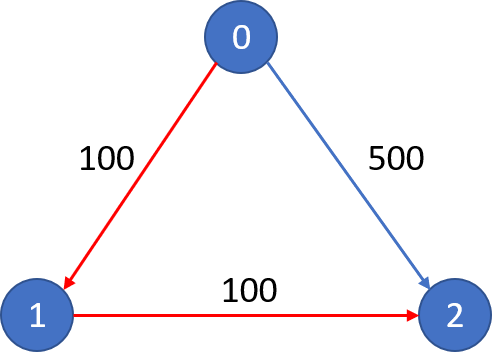[LeetCode] 787. Cheapest Flights Within K Stops K次转机内的最便宜航班
2024-10-08 07:17:55
There are n cities connected by m flights. Each fight starts from city u and arrives at v with a price w.
Now given all the cities and fights, together with starting city src and the destination dst, your task is to find the cheapest price from src to dst with up to k stops. If there is no such route, output -1.
Example 1:
Input:
n = 3, edges = [[0,1,100],[1,2,100],[0,2,500]]
src = 0, dst = 2, k = 1
Output: 200
Explanation:
The graph looks like this:

The cheapest price from city0to city2with at most 1 stop costs 200, as marked red in the picture.
Example 2:
Input:
n = 3, edges = [[0,1,100],[1,2,100],[0,2,500]]
src = 0, dst = 2, k = 0
Output: 500
Explanation:
The graph looks like this:

The cheapest price from city0to city2with at most 0 stop costs 500, as marked blue in the picture.
Note:
- The number of nodes
nwill be in range[1, 100], with nodes labeled from0ton- 1. - The size of
flightswill be in range[0, n * (n - 1) / 2]. - The format of each flight will be
(src,dst, price). - The price of each flight will be in the range
[1, 10000]. kis in the range of[0, n - 1].- There will not be any duplicated flights or self cycles.
Java:
class Solution {
public int findCheapestPrice(int n, int[][] flights, int src, int dst, int K) {
Map<Integer, Map<Integer, Integer>> prices = new HashMap<>();
for (int[] f : flights) {
if (!prices.containsKey(f[0])) prices.put(f[0], new HashMap<>());
prices.get(f[0]).put(f[1], f[2]);
}
Queue<int[]> pq = new PriorityQueue<>((a, b) -> (Integer.compare(a[0], b[0])));
pq.add(new int[] {0, src, k + 1});
while (!pq.isEmpty()) {
int[] top = pq.remove();
int price = top[0];
int city = top[1];
int stops = top[2];
if (city == dst) return price;
if (stops > 0) {
Map<Integer, Integer> adj = prices.getOrDefault(city, new HashMap<>());
for (int a : adj.keySet()) {
pq.add(new int[] {price + adj.get(a), a, stops - 1});
}
}
}
return -1;
}
}
Python:
class Solution(object):
def findCheapestPrice(self, n, flights, src, dst, K):
"""
:type n: int
:type flights: List[List[int]]
:type src: int
:type dst: int
:type K: int
:rtype: int
"""
adj = collections.defaultdict(list)
for u, v, w in flights:
adj[u].append((v, w))
best = collections.defaultdict(lambda: collections.defaultdict(lambda: float("inf")))
min_heap = [(0, src, K+1)]
while min_heap:
result, u, k = heapq.heappop(min_heap)
if k < 0 or best[u][k] < result:
continue
if u == dst:
return result
for v, w in adj[u]:
if result+w < best[v][k-1]:
best[v][k-1] = result+w
heapq.heappush(min_heap, (result+w, v, k-1))
return -1
Python:
class Solution(object):
def findCheapestPrice(self, n, flights, src, dst, K):
"""
:type n: int
:type flights: List[List[int]]
:type src: int
:type dst: int
:type K: int
:rtype: int
"""
f = collections.defaultdict(dict)
for a, b, p in flights:
f[a][b] = p
heap = [(0, src, k + 1)]
while heap:
p, i, k = heapq.heappop(heap)
if i == dst:
return p
if k > 0:
for j in f[i]:
heapq.heappush(heap, (p + f[i][j], j, k - 1))
return -1
C++:
// Time: O((|E| + |V|) * log|V|) = O(|E| * log|V|)
// Space: O(|E| + |V|) = O(|E|) class Solution {
public:
int findCheapestPrice(int n, vector<vector<int>>& flights, int src, int dst, int K) {
using P = pair<int, int>;
unordered_map<int, vector<P>> adj;
for (const auto& flight : flights) {
int u, v, w;
tie(u, v, w) = make_tuple(flight[0], flight[1], flight[2]);
adj[u].emplace_back(v, w);
} unordered_map<int, unordered_map<int, int>> best;
using T = tuple<int, int, int>;
priority_queue<T, vector<T>, greater<T>> min_heap;
min_heap.emplace(0, src, K + 1);
while (!min_heap.empty()) {
int result, u, k;
tie(result, u, k) = min_heap.top(); min_heap.pop();
if (k < 0 ||
(best.count(u) && best[u].count(k) && best[u][k] < result)) {
continue;
}
if (u == dst) {
return result;
}
for (const auto& kvp : adj[u]) {
int v, w;
tie(v, w) = kvp;
if (!best.count(v) ||
!best[v].count(k - 1) ||
result + w < best[v][k - 1]) {
best[v][k - 1] = result + w;
min_heap.emplace(result + w, v, k - 1);
}
}
}
return -1;
}
};
All LeetCode Questions List 题目汇总
最新文章
- WIN7 + IIS7 Service Unavailable HTTP Error 503. The service is unavailable.
- jira任务批量操作示例
- 解压版mysql安装
- 如何创建多个Memcached服务
- file_get_contents()获取https出现这个错误Unable to find the wrapper “https” – did
- [Effective JavaScript 笔记] 第6条:了解分号插入的局限
- Ansible的循环
- NuMicro Coretex™-M0家族中哪种芯片支持UID (Unique ID)? 用户该怎么做才能对其芯片进行加密功能?
- SCGHR 系统设计
- UITableVIewcell中图片不能改变大小的原因
- 设置Eclipse启动JDK
- ecostore搜索注意事项
- Docker 网络管理及容器跨主机通信
- Java Pom.xml 详解
- RSA 算法
- 1.App爬取相关库的安装(安装Charles及手机端证书安装配置)
- Oracle密码过期the password has expired解决办法
- vuex 定义
- Java学习 · 初识 IO流
- 浅谈CSRF攻击方式(转)